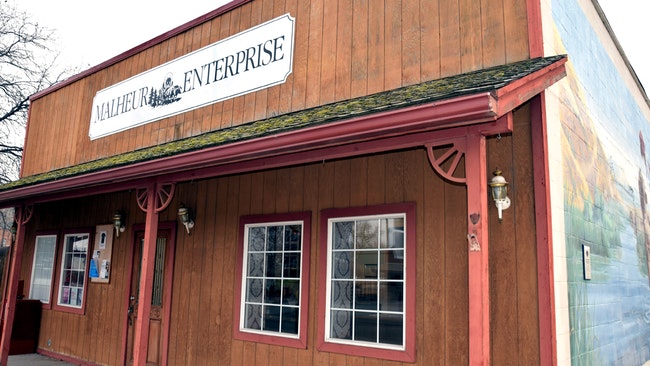
VALE – The Malheur Enterprise was picked as one of 12 newsrooms across the U.S. to join the Solutions Journalism Revenue Project, providing an opportunity to experiment with a reporting approach that could help develop new sources of revenue.
The project is part of the Solutions Journalism Network, a New York based nonprofit organization that advocates for a more evidence-based approach to reporting on responses to social issues.
Solutions journalism, in the words of Tina Rosenberg, co-founder and vice president for innovation at the Solutions Journalism Network, is journalism focused on how people are responding to problems, and what results those responses bring.
Solutions journalism is not cheerleading, advocacy or fluff, Rosenberg said, but involves covering issues themselves.
“What is going on here? What is happening? What is the result? And what can we learn from it,” Rosenberg said.
The Enterprise staff will receive special coaching in the solutions journalism approach, and business development from the Solutions Journalism Network staff and outside experts.
No other Oregon newsroom was picked from among 100 newsrooms nationwide competing to participate.
“This provides an extraordinary opportunity to bring national help to Malheur County,” said Les Zaitz, Enterprise publisher. “This is part of our continuing effort to get stronger, to do more and to better serve our community. The selection of the Enterprise is rather remarkable given our size and rural location.”
Across the country, communities are losing media sources as local newspapers downsize or disappear.
“It is a terrible time for media,” Rosenberg said. “Thousands of local news organizations are closing. Advertising is collapsing as a business model.”
So, finding alternate reporting methods, such as solutions journalism, is key to ensuring that communities don’t go without their local news.
Damian Radcliffe is a journalism professor at the University of Oregon who researches digital trends, the business of media, and the evolution of journalism among other topics.
Radcliffe said that the largest and most obvious challenge currently for media, both large and small, is the struggle to come up with a mix of income sources to prosper in the digital age.
Advertising was once lucrative, Radcliffe said, but now that money has migrated to platforms like Facebook and Google, and the digital equivalent is nowhere near as lucrative as traditional advertising once was.
This trend in advertising as a business model for media has created what Radcliffe calls, “huge revenue black holes,” leaving media outlets facing the question of how to fill those holes to survive.
Rosenberg outlined reasons why solutions journalism could remedy the troubling trends.
[ KEEP YOUR LOCAL NEWS STRONG – SUBSCRIBE ]
Solutions journalism has piqued the interest of philanthropists and foundations who are often willing to fund projects with a solutions component, Rosenberg said.
Also, solutions journalism helps build community trust in the sense that it focuses on issues people feel they can get behind.
“The problem with lack of trust in news organizations isn’t accuracy. It is a story selection issue,” Rosenberg said.
Rosenberg said that a lot of people are disengaged from the news because they perceive too much negativity.
“I believe audiences really want this type of coverage,” Radcliffe said of the solutions method. “A lot of negative media can be off-putting – as news avoidance being an emerging trend – in the U.S. and indeed around the world.”
Solutions journalism, on the other hand, shows people that steps are being taken to solve issues, and that those things are producing results. In other words, there are solutions to problems and identifiable results instead of just problems.
“We are not just going to share a doom and gloom narrative on difficult societal issues,” Radcliffe said of solutions journalism. “We are going to point out that reality. But at the same time, highlight that there are individuals and organizations that are trying to address the problems and report on them with the same level of interrogation as we would do with any other stories.”
That distinction between good intentions and results, is an important one to make when considering solutions journalism, Rosenberg said.
Rosenberg said the Enterprise was chosen as the only newsroom in Oregon and in the Northwest to participate in the project because it is “scrappy, energetic and creative…You guys are doing a lot with a little”
Alec Saelens, manager of the project for the Solutions Journalism Network, explained how newsrooms were selected.
He said service to marginalized communities was considered. The network looked for newsrooms, Saelens said, that focus on rural communities.
“We saw in the Enterprise a newsroom that was operating in a rural area that was doing extremely good journalism, and great reporting despite not calling itself solutions journalism,” Saelens said.
Organizations like the Solutions Journalism Network view experimentation with different business models and methods of reporting as imperative to the future of providing news to local communities.
“It is basically that the business model for news is collapsing and nobody has a way to replace it,” Rosenberg said. “We have to experiment to find ways to keep our news organizations alive.”
Rosenberg explained that when news organizations in local communities go under, corruption increases, ultimately costing taxpayers.
Saelens said that what also sealed the deal with the Enterprise was the fact that the paper now covers the sizeable Latino community in Malheur County, and that both the network and Zaitz were confident that the Enterprise was an ideal environment to experiment with and produce quality solutions journalism focused on the Latino community.
“It is a model for sustainability that can be replicated elsewhere,” Saelens added. “There was a real appetite for the kind of reporting the Malheur Enterprise was doing on the local level.”
News tip? Contact reporter Joe Siess: [email protected] or 541-473-3377.
For the latest news, follow the Enterprise on Facebook and Twitter.
SUBSCRIBE TO HELP PRODUCE VITAL REPORTING — For $5 a month, you get breaking news alerts, emailed newsletters and around-the-clock access to our stories. We depend on subscribers to pay for in-depth, accurate news produced by a professional and highly trained staff. Help us grow and get better with your subscription. Sign up HERE.




